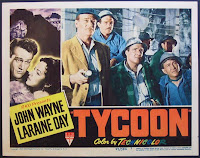Tycoon
 When Hollywood sends its stars down to Latin America, they typically have to face one or other of two challenges: cultural difference or natural indifference. In Tycoon, megastar John Wayne has to face both, albeit only one at a time.
When Hollywood sends its stars down to Latin America, they typically have to face one or other of two challenges: cultural difference or natural indifference. In Tycoon, megastar John Wayne has to face both, albeit only one at a time.Wayne plays Johnny Munroe, an engineer leading the effort to blast a tunnel through an Andean mountain so that a railroad can reach the mines owned by local tycoon Frederick Alexander. For the first half of the movie, we see Johnny as a happy-go-lucky guy, who likes a drink and a night out on the local town with the other ex-pat Americans who make up his team. During one such bacchanal, hungover or still drunk on the Sunday morning, he notices a beautiful young woman on her way to church, and follows along. It turns out that he's chasing the tycoon's daughter, Maura, and Johnny's forced to learn the complex rules for courting such a high-class Latin gal.
Unsurprisingly, our carousing hero breaks these rules as often as not, and the courtship is brought to a rather abrupt end when he and Maura are discovered to have spent the night at a local Inca ruin, having got lost in the jungle en route back to town. Local tradition, it seems, demands that a couple caught in such a compromising position have immediately to enter into a shotgun wedding. So Maura goes off to live with her new husband at the engineer's camp high in the mountains, but her father's dislike of the set-up follows her there and determines the shift in the film's tone and theme.
 The second half of the movie is a study in stubbornness. Johnny and his father-in-law are solidly set against each other: Alexander determines to turn down all his engineer's requests, and to make his work increasingly difficult; the son-in-law in turn refuses ever to back down. But stubbornest of all is the mountain through which the railroad is to run. For all the rhythmic sequence of blasts that punctuate the action, and the ever-present labor that goes on night and day, rockfalls and finally a fatality mean that the tunnel is abandoned. "You can't drive through this crazy mountain." But the alternative, taking the line around a pass and building a bridge across a narrow gorge, is equally risky, especially at the breakneck pace that Munroe insists on keeping.
The second half of the movie is a study in stubbornness. Johnny and his father-in-law are solidly set against each other: Alexander determines to turn down all his engineer's requests, and to make his work increasingly difficult; the son-in-law in turn refuses ever to back down. But stubbornest of all is the mountain through which the railroad is to run. For all the rhythmic sequence of blasts that punctuate the action, and the ever-present labor that goes on night and day, rockfalls and finally a fatality mean that the tunnel is abandoned. "You can't drive through this crazy mountain." But the alternative, taking the line around a pass and building a bridge across a narrow gorge, is equally risky, especially at the breakneck pace that Munroe insists on keeping.Under increasing pressure, Johnny throws himself into his work, abandons his young wife, turns on his former friends, and becomes an increasingly tyrannical and insensitive overseer. Repulsed by this cruel and indifferent and utterly masculine world ("What's wrong with this place?" "I hate it." "That's because you are a woman"), Maura returns to her father, who feels that his original displeasure towards her husband is proved right, according to the adage that Latin America's stubborn nature, indifferent to human attempts to change it, reveals the truth of human personality: "Put a man in the jungle and you will discover what his real nature is. The veneer wears pretty thin."
So Tycoon brings together two rather contrasting versions of Latin America: cultural adornment on the one hand, and unadorned nature on the other. The film's failure (it was a box office disappointment given that it was studio RKO's most expensive movie to date) perhaps stems from its inability to resolve that tension, or even really to acknowledge it. In the end, Johnny proves himself with his personal courage in the face of impending natural disaster as a storm surge threatens to topple the half-completed bridge, and he and Maura reconcile though it's not entirely clear or convincing why.
For most of the film, Wayne's character is shadowed by a young double, a local boy called "chico" who tells his friends to call him Johnny Munroe, and that he too is an engineer driving a railroad across the cordillera. But this conceit fades away as it becomes clear that chico has little or nothing to imitate: the irony is that Hollywood's leading man, John Wayne the archetypal male action hero, is here purely reactive, simply a function of the challenges he is posed. There's no consistency to his character; he is as hollow as the mountain is solid, as bland as the culture he faces is complex.
Labels: andes, masculinity
